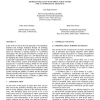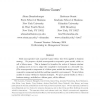1616 search results - page 80 / 324 » Robust game theory |
ICAPR
2005
Springer
14 years 2 months ago
2005
Springer
There is need for more formal specification of recognition tasks. Currently, it is common to use labeled training samples to illustrate the task to be performed. The mathematical ...
NOSSDAV
2005
Springer
14 years 2 months ago
2005
Springer
We are concerned with the fundamental problem of event ordering in multiplayer peer-to-peer games. Event ordering, even without faults, requires all-to-all message passing with at...
WSC
2000
13 years 10 months ago
2000
In this work we want to show the importance of visualization, interfaces and re-design techniques through 3D modeling, animations and VRML in the developing of the simulation game...
MANSCI
2007
13 years 8 months ago
2007
Both noncooperative and cooperative game theory have been applied to business strategy. We propose a hybrid noncooperative-cooperative game model, which we call a biform game. Thi...
BCSHCI
2009
13 years 6 months ago
2009
In this paper we discuss the different elements of the gaming experience and their relation to other concepts within HCI. The objective is to showcase how the different elements t...


